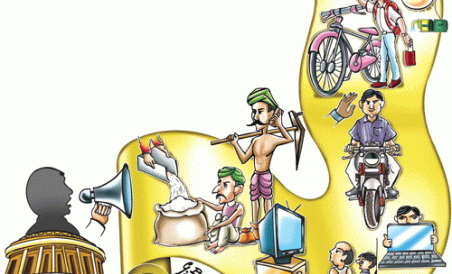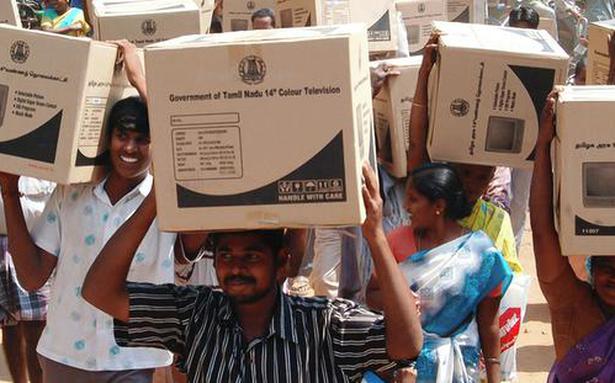Uttar Pradesh assembly elections: A Jamboree of Freebies and Utopias

By Sudhir Kumar
Elections in India are not only a boisterous celebration of democracy, but also an extravaganza of money power, lung power and muscle power. There is another feature that lends Indian democracy a distinct flavour: the raining of freebies and promises in the poll season as parties and contestants become unabashed dream merchants, peddling utopias to the electorate. And some of the freebies that they promise are downright funny, baffling and weird, but these surely provide a rather comical relief in otherwise serious business of balloting.
To be fair enough to Indian elections, western democracies have also their share of idiosyncratic poll promises. Former US House of Representatives speaker Newt Gingrich, who was looking to contest the US presidential polls in 2012, promised to set up a permanent American colony on the moon by 2020. During the same elections, Vermin Supreme, a performance artiste, promised to gift a pony to every American if he was elected president. He said he wanted the country to become a pony-based economy.
So perhaps taking a cue from Elon Musk’s Spacex that sent its first crewed flight in 2020, an independent candidate, Saravanan, who was a contestant in last year’s Tamil Nadu assembly elections from South Madurai constituency, promised a 100-day vacation on the moon! That was not the only chimera he tried to peddle; he also promised Rs one crore for young voters, a three-storey house with a swimming pool, a helicopter, a car, a robot and an iPhone.

Some other candidates have not gone to the extent of offering vacation on the moon, but their list of freebies is fascinating: laptops, pressure cookers, scooters, wet grinders (for dosa batter), bicycles, cows, gold, Wi-Fi, data, electricity, water, even mangalsutras – all for free.
The list is endless. AM Sheik Davood, an independent candidate from Tirupur Lok Sabha constituency ahead of the 2019 general elections, promised 10 litres of unadulterated brandy imported from Puducherry, to every house per day, saying it will double as medicine.
Another independent candidate, Akula Hanumantha Rao, distributed slippers to the voters of Koratla constituency ahead of the 2018 Telangana assembly elections, saying if he failed to deliver, the voters were free to shower the footwear on him.
One can understand the frivolity behind such unattainable promises made by independent candidates because they know that their chances of winning the elections are slim. But at times even candidates of mainstream national parties make crazy poll promises. So, Bharatiya Janata Party (BJP) woman candidate from Rajasthan, Shobha Chauhan, promised no police intervention in child marriages if she wins the Sojat assembly seat in the 2018 elections. Expectedly, it was widely condemned, but she managed to win.
The 2022 assembly elections in Uttar Pradesh, the results of which will be declared on March 10, have also a heavy dose of promises and freebies. The BJP has released “Lok Kalyan Sankalp Patra” (manifesto), the SP its “Samajwadi Vachan Patra”, and the Congress “Bharti Vidhan”, all of which are peppered with lofty promises encompassing all sections of the society. These include free electricity for farmers, jobs, self-employment opportunities and entrepreneurship, healthcare, and women empowerment. These poll promises broadly deal with Agriculture, Education, Women, Youth & Self-employment, and the Poor.
While the Congress party’s manifesto promises a string of initiatives for women and youth, those of the BJP and the SP have a pronounced tilt in favour of farmers and youth. The Bahujan Samaj Party (BSP), another major contestant, has decided not to release its manifesto. Party chief Mayawati says manifesto release by rival parties is ‘mere flaunting of false promises’.
Acutely aware that farmers form an important vote bank, the BJP has promised free electricity to them, payment to sugarcane growers within 14 days of selling their crops, a Rs 5,000-crore irrigation scheme and Rs 1,000 crore for payment under the Minimum Support Price (MSP) regime towards crops like potato, tomato and onion. Assurance of MSP was a key demand of the protesting farmers against the Central government’s farm laws that were subsequently withdrawn.
The saffron party has also promised doubling the amount of the Pradhan Mantri Kisan Samman Nidhi (PMKISAN) scheme for landless farmers from Rs 6,000 annually which is directly transferred to beneficiaries in three instalments of Rs 2,000 each. In the next five years, the government will strengthen wheat and paddy purchase at MSP. The party manifesto proposes modernisation of existing sugar mills, in an apparent intent to appease farmers.
The SP has promised free power for irrigation and interest-free loans to farmers, MSP on every crop with the expansion of Kisan Bazzar network, and payments to sugarcane farmers within 15 days of selling their crops. It also promises to make farmers free from debt by 2025.
The Congress manifesto does not dwell upon agriculture in great details, except a farm loan waiver to all farmers within 10 days of forming government, increasing the MSP of wheat and paddy to Rs 2,500 per quintal, and an MSP of Rs 400 for sugarcane farmers. It also promises Rs 3,000 compensation to farmers if their crop is damaged by stray animals.
Education is one area that has caught the attention of all the major political parties. The BJP proposes to give free scooters to college-going female students. It also promises to provide two crore tablets and smartphones and equip 30,000 middle schools with Wi-Fi-based smart classes. There will also be free coaching for competitive examinations besides gym and sporting grounds in every gram panchayat. Further, MBBS seats will be doubled while and 6,000 doctors and 10,000 paramedical staff are to be recruited.
Not to be outdone, the SP’s manifesto proposes a free laptop to every 12th pass student, a free tablet to every 10th pass student, and free education for girls from primary classes till post-graduation. The party puts special focus on skill development and imposing a ban on contractual hiring in educational institutes.
The Congress manifesto talks about waiving off the charges for all examination forms and the travel cost by bus and trains. It also proposes to increase the budget for education, and the launch of a single-window scholarship portal.
For the welfare of women, the BJP has proposed two additional LPG cylinders to them on Holi and Diwali, Rs 1 lakh to a poor family on the wedding of their daughters, Rs 1,500 monthly pension to widows and destitute women, and free public transport for women aged over 60. There will be financial assistance of up to Rs one lakh for marriage of girls belonging to poor families. Another important feature of the manifesto is the assurance to allocate Rs 5,000 crores for a corpus to form women self-help groups in the state.
Significantly, it has announced 10-year imprisonment for those involved in ‘love-jihad’ (read ‘Hindu-Muslim’ marriages, allegedly through deception or inducement). Some other promises include a Ramayan University in Ayodhya, and Lata Mangeshkar Performing Arts Academy.
The SP has offered two free gas cylinders besides 33 per cent reservation in government jobs for women, including in the police department.
The Congress, in its promise to create 20 lakh jobs in the state, says eight lakh jobs will be guaranteed for women. Also, three gas cylinders will be given to women while a minimum honorarium of Rs 10,000 per month for anganwadi workers will be paid.
In order to woo the youth, the BJP has sought to build an industrial park near all expressways and six industrial parks for MSMEs (micro, small and medium enterprises) to generate more job opportunities. The SP has promised an unemployment allowance for youth and creation of 10 lakh jobs for them besides one crore jobs in the MSME sector and another 22 lakh in the IT sector. The Congress has proposed to boost startups in the state, create a ‘Seed Startup Fund’ worth Rs 5,000 crore, and prioritise the entrepreneurs below 30 years of age.
There is another segment of population that all parties have tried to woo – the poor people. The Niti Aayog’s first Multidimensional Poverty Index (MPI) report, released last year, listed Uttar Pradesh as the third-most poor state in terms of people living below the poverty line (BPL). At about 38 per cent, more than one in every three voters in the state, is poor.
The BJP has promised to open Maa Annapurna Canteens to offer food at a minimum price. The SP has proposed Samajwadi Thaali (plate) at Rs 10 to the poor and consumption of electricity free up to 300 units a month. The Congress has promised free medical treatment up to Rs 10 lakh for all ailments and reduce electricity bills to half for all classes of consumers.
But what trumps all is a promise by Suheldev Bharatiya Samaj Party (SBSP) chief Om Prakash Rajbhar. So, three riders will be allowed on a bike if his party forms a government in the state. “A train carries 300 passengers on 70 seats and doesn’t get challans… Why is there a challan if three people ride a bike? When our government comes to power, three riders will be able to ride a bike for free, otherwise, we’ll challan jeeps and trains.”
Rajbhar, whose party is an ally of the SP, is fighting from the Zahoorabad assembly constituency in Ghazipur district.
The fact is people are aware that tall promises are customary in any elections and political parties and their leaders are hardly accountable in case their non-fulfilment.
Even the Supreme Court is not amused the way freebies are being doled out in election times. It has issued notices to the Centre and the Election Commission on a petition seeking the top court’s intervention to stop the practice of political parties either distributing or promising “irrational freebies” to the electorate in the run-up to any elections.
While observing that freebies in election times were not a corrupt practice under electoral laws, the court agreed that it was a “serious issue” as such freebies could create an uneven playing field between the contesting parties. “The freebie budget is going beyond the regular budget,” it noted and asked the Election Commission to frame guidelines, under the model code of conduct, which would have a salutary effect on parties in the fray.
Short URL: https://indiandownunder.com.au/?p=17556
